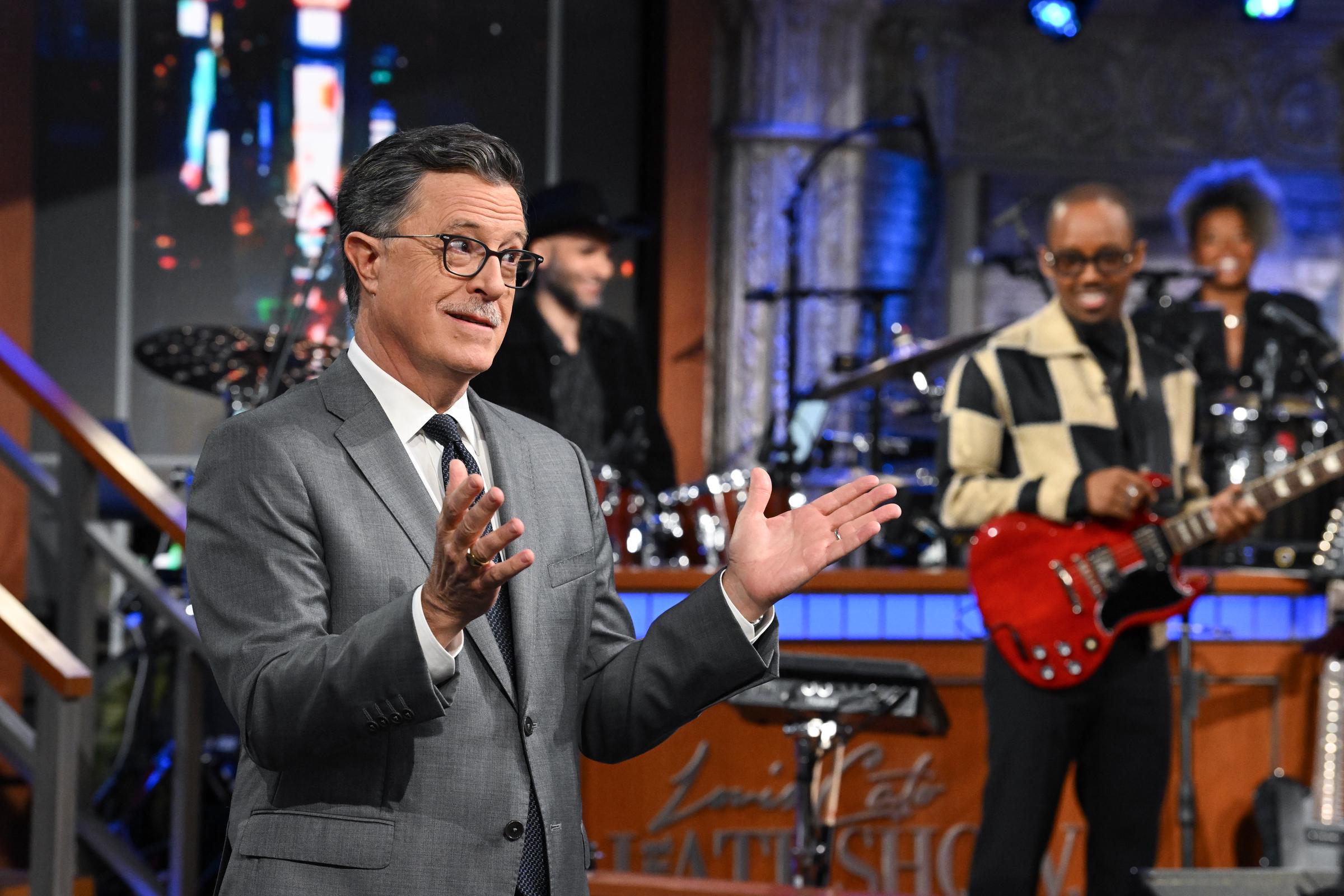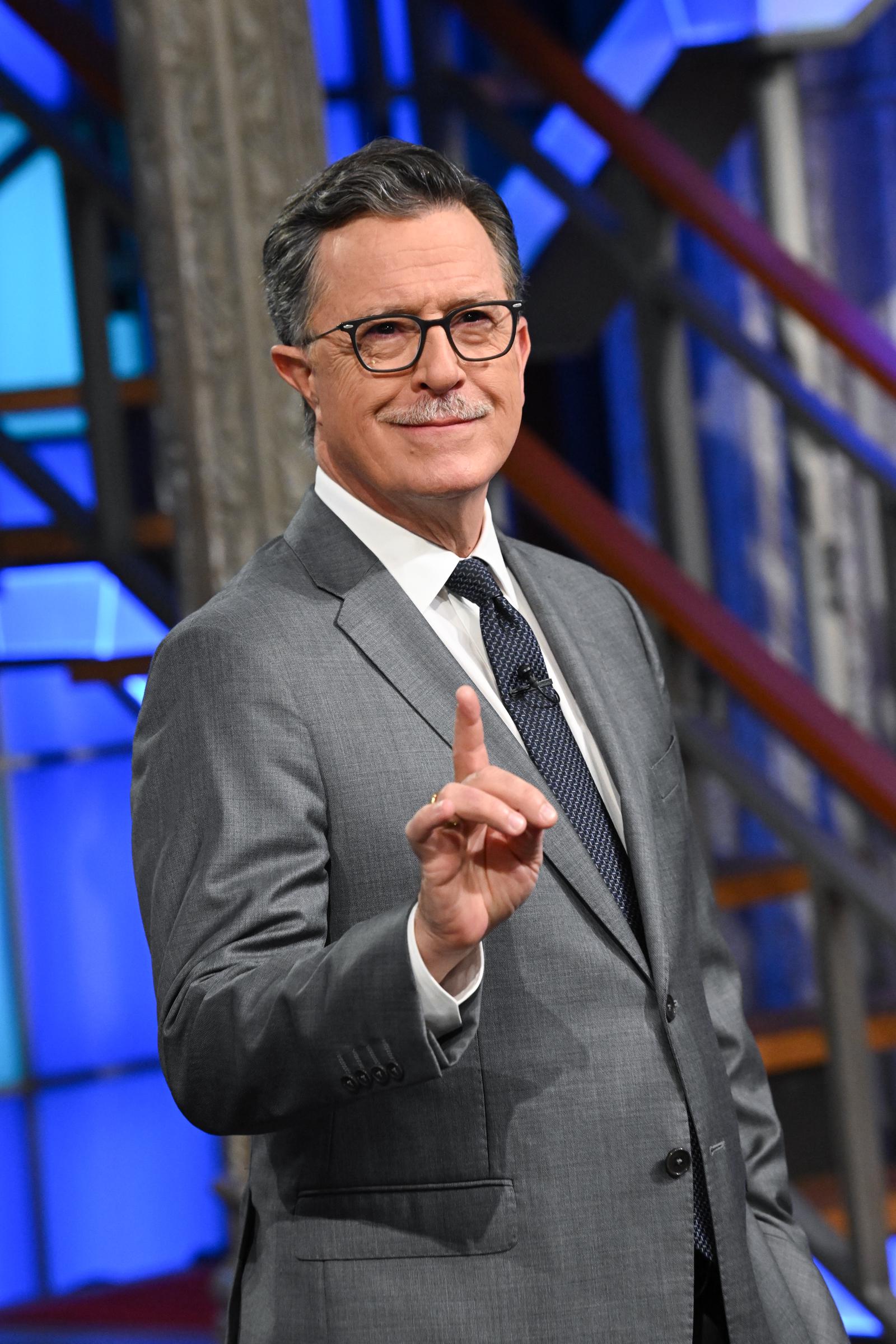Stephen Colbert’s ‘The Late Show’ to Conclude After Decade-Long Run Following CBS Network Decision
CBS has announced the conclusion of “The Late Show with Stephen Colbert” after ten seasons, marking the end of a significant chapter in late-night television history. The decision, which host Stephen Colbert revealed to his audience during a taping at the Ed Sullivan Theater on July 17, 2025, has generated widespread discussion about the future of traditional late-night programming.

The Announcement
During Thursday’s taping, Colbert addressed his audience with a mix of gravity and characteristic humor, informing them of the network’s decision. “I want you to know something that I found out just last night,” Colbert began. “Next year will be our last season. The network will be ending the ‘Late Show’ in May.”

The audience’s immediate reaction of disappointment was palpable, with audible expressions of dismay filling the historic theater. Colbert acknowledged their response while providing additional context about the decision’s scope. “It’s not just the end of our show, but it’s the end of ‘The Late Show’ on CBS. I’m not being replaced,” he clarified, indicating that the network would not continue the franchise beyond his tenure.
Network Partnership and Gratitude
Despite the disappointing news, Colbert expressed appreciation for his relationship with CBS throughout his decade-long run. He characterized the network as “great partners” and reflected on the collaborative nature of the production process. His comments highlighted the extensive team effort required to produce the daily show, acknowledging the approximately 200 staff members who contribute to the program’s success.

“I am extraordinarily, deeply grateful to the 200 people who work here,” Colbert stated. “We get to do this show. We get to do this show for each other every day, all day, and I’ve had the pleasure and the responsibility of sharing what we do every day with you in front of this camera for the last 10 years.”
The host’s remarks underscored the personal investment and daily commitment required to maintain a successful late-night television program, emphasizing the collaborative effort that extends far beyond the on-camera presence.
CBS Official Statement and Financial Context
CBS provided an official statement to People magazine explaining the rationale behind the decision. The network characterized the conclusion as “purely a financial decision against a challenging backdrop in late night,” explicitly stating that the choice was “not related in any way to the show’s performance, content or other matters happening at Paramount.”

This explanation places the decision within the broader context of economic challenges facing the entertainment industry, particularly in the late-night television sector. The statement suggests that despite the show’s success in terms of ratings and content quality, financial considerations ultimately drove the network’s decision-making process.
Historical Context and Legacy
“The Late Show with Stephen Colbert” premiered on September 8, 2015, following the retirement of David Letterman, who had hosted the program for over two decades. Letterman’s departure marked the end of an era, as he had established “The Late Show” as a cornerstone of CBS’s late-night programming throughout his extensive career spanning more than thirty years.
When CBS selected Colbert as Letterman’s successor, the network offered him significant creative freedom to develop his own version of the show. This transition represented a notable shift for Colbert, who had previously been known for his satirical persona on Comedy Central’s “The Colbert Report.” CBS explicitly promised viewers they would see “the real Stephen Colbert,” signaling a departure from his previous comedic character.
Programming Philosophy and Success
Colbert’s approach to “The Late Show” distinguished itself through a pronounced political focus, incorporating sharp commentary on current events and political developments. This editorial stance became a defining characteristic of his version of the program, setting it apart from other late-night offerings while maintaining traditional elements such as celebrity interviews, musical performances, and comedy segments.
The show’s format successfully balanced political commentary with entertainment value, featuring interviews with newsmakers, cultural figures, and entertainers. This combination proved effective in attracting and maintaining viewership, contributing to the program’s consistent ratings success.
Ratings Performance and Industry Standing
“The Late Show with Stephen Colbert” achieved remarkable success in television ratings, securing the top position in late-night programming for nine consecutive seasons. This sustained dominance represents a significant achievement in an increasingly competitive and fragmented media landscape, where audience attention is divided among numerous platforms and viewing options.
The show’s ratings success demonstrates the continued viability of traditional late-night television programming, even as the media industry undergoes significant transformation. This performance record makes the network’s decision to conclude the program particularly noteworthy, as it suggests that even successful programming may face challenges in the current economic environment.
Public Response and Industry Reaction
The announcement of the show’s conclusion generated significant response across social media platforms, with fans expressing disappointment and confusion regarding CBS’s decision. Many commentators noted the apparent contradiction between the show’s ratings success and the network’s choice to end the program.
Online discussions reflected broader concerns about the future of late-night television and the factors influencing network programming decisions. Fans questioned the wisdom of concluding a successful program, particularly given Colbert’s established audience and the show’s consistent performance metrics.
Some supporters expressed optimism about Colbert’s future prospects, suggesting that his talent and established reputation would likely lead to new opportunities in television or other media platforms. This perspective reflects confidence in Colbert’s ability to adapt to changing industry conditions and continue his career in entertainment.
Broader Industry Implications
The conclusion of “The Late Show with Stephen Colbert” occurs within a broader context of challenges facing traditional television programming. The entertainment industry continues to grapple with changing viewer habits, increased competition from streaming platforms, and evolving advertising markets.
Late-night television, in particular, faces unique challenges as audiences increasingly consume content through digital platforms and on-demand services. The traditional model of appointment television viewing has been disrupted by streaming services and social media platforms that allow viewers to access content at their convenience.
Continuing Creative Involvement
Despite the conclusion of his late-night show, Colbert’s creative relationship with CBS continues through other projects. In 2023, he was announced as executive producer of “After Midnight,” a new late-night series hosted by comedian Taylor Tomlinson. This program represents an attempt to capture younger, digitally-native audiences through a comedic game show format.
The show draws inspiration from Comedy Central’s “@midnight with Chris Hardwick,” adapting the concept for CBS’s programming strategy. Colbert’s involvement in this project demonstrates his continued influence on the network’s late-night programming approach, even as his own show prepares to conclude.
Timeline and Future Considerations
The final season of “The Late Show with Stephen Colbert” will conclude in May 2026, providing approximately ten months for the show to wrap up its run. This extended timeline allows for proper closure of the program while maintaining the quality and consistency that has characterized the show throughout its decade-long existence.
The extended conclusion period also provides opportunities for special programming, retrospective content, and appropriate farewell elements that acknowledge the show’s significant contribution to late-night television. This approach recognizes the program’s cultural impact and provides closure for both the production team and the viewing audience.
Conclusion
The conclusion of “The Late Show with Stephen Colbert” represents a significant moment in television history, marking the end of a successful program that has shaped political discourse and late-night entertainment for a decade. While the decision reflects broader economic challenges facing the entertainment industry, the show’s legacy as a ratings leader and cultural influencer remains intact.
As the television landscape continues to evolve, the conclusion of established programs like “The Late Show” highlights the ongoing transformation of traditional media. The decision underscores the complex factors that influence network programming choices, extending beyond simple ratings success to encompass broader financial and strategic considerations.
The impact of Colbert’s work on “The Late Show” will likely continue to influence late-night television and political commentary, regardless of the program’s conclusion. His decade-long tenure has established him as a significant voice in American media, and his future endeavors will be closely watched by both industry professionals and audiences alike.

